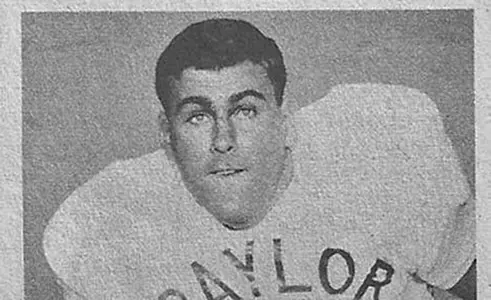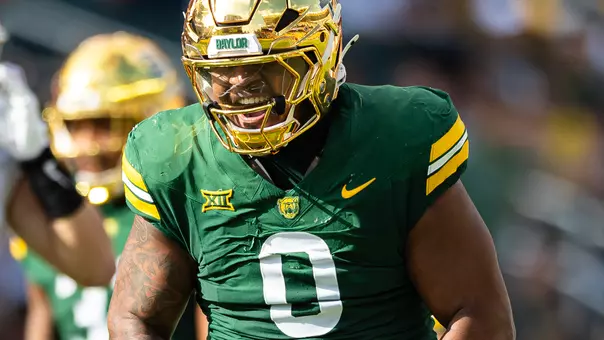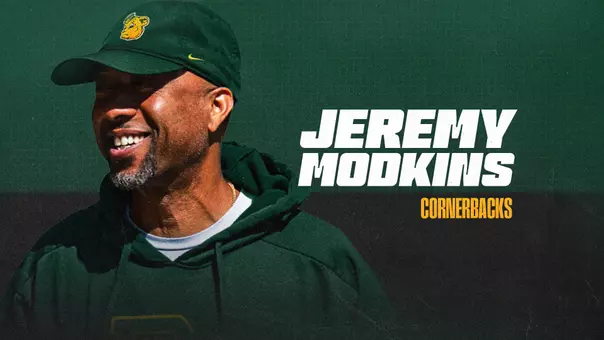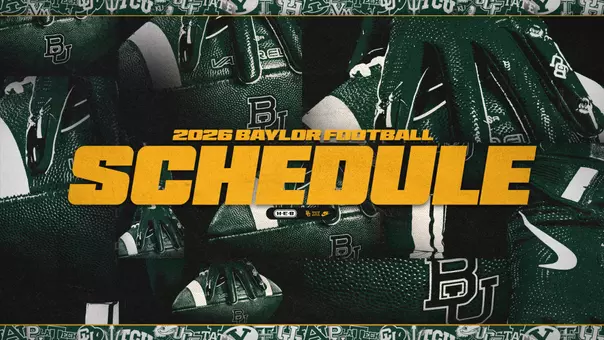
2014 Hall of Fame Profile: Richard Stevens
10/13/2014 12:00:00 AM | Football, General, "B" Association
By Jerry Hill
Baylor Bear Insider
Forty years later, Richard Stevens calls it "building character."
The former all-state and prep All-American defensive tackle from Dublin, Texas, was switched to offensive tackle and played on Baylor teams that won a combined four games in three varsity seasons (1967-69) under head coaches John Bridgers and Bill Beall.
"My senior year was pretty difficult, let's put it that way," Stevens said of the winless 1969 campaign. "I went to spring training and tore up my knee. When the season started, I played, but I wasn't as good I was before. But I was able to get through the season. I had to sit out some of the games, but we got through it. That's the season we built character."
That experience prepared him for six seasons with the Philadelphia Eagles. Drafted in the 13th round, Stevens ended up having three more knee injuries and a broken hand and never had a winning season while playing for three different head coaches.
"We built character during those years, too," he said. "I remember we did beat the Cowboys once, though."
A unanimous All-Southwest Conference pick in 1968 and named to Baylor's All-Decade Team of the `60s, Stevens is part of the 2014 induction class for the Baylor Hall of Fame.
"When I got the call from ("B" Association Executive Director Walter Abercrombie), I could not believe it," said the 66-year-old Stevens. "I want to go in knowing that I'm representing the people I played with. We had some success and we had some not so successful times. But the most important thing is that that friendship and teamwork and everything else is still solid, even today. And I appreciate that."
Guys like Ted Gillum and John Armstrong, Terry Newman and Ron Evans, remain some of his closest friends nearly 50 years after they entered Baylor together as freshmen.
"It's amazing how you bond," he said. "But it's more amazing how that bond stays with you throughout the years. My son went to Baylor and finished in the mid-`90s. And when he goes to the games and sees his friends, they're the kids of the guys that I played with. And now, we're exposing our grandkids to all of this. It's been a lot of fun watching our kids grow up."
Coming from a one-stoplight town like Dublin - a dot on the map of Texas that's best known for the Dr. Pepper plant - Stevens said the odds "definitely weren't in my favor" to make it to the NFL one day.
But those dreams were hatched at a very young age, when he would crawl up and watch the Dublin High School games from a lawn chair on the top of his flat-roof house across the street from the stadium.
"I had the best seat in the house," he said.
As the nephew of former Baylor football letterman Gordon Hollon (1942-46), Stevens also grew up coming to Baylor games and getting indoctrinated early on.
"He was a tremendous influence," Stevens said. "I was always a pretty big guy, bigger than everybody in our class. So, when I started playing football in junior high, going into high school, I felt like there was some potential there. And I think my uncle recognized that, too, so he started recruiting me at an early age."
Nicknamed "Truck," Stevens was a two-way starter at tight end and defensive tackle for the Dublin Lions. He was a three-time all-district pick, earned all-area and all-state honors his last two seasons and garnered prep All-America honors as a senior in 1965.
"I happened to be at the right place at the right time," he said.
During the recruiting process, Stevens visited Arkansas, Texas A&M, TCU and SMU and canceled a trip to Texas when he signed with Baylor.
"I think (Texas was) kind of upset that I did that," he said, "but I knew I was going to Baylor, anyway."
Recruited as a defensive tackle, Stevens stuck with that side for the freshman team in '66, but got switched to offensive tackle the next year.
"I don't know, I think Coach Bridgers saw some potential there," Stevens said of the move. "He was obviously offensive-oriented when he coached in the pros. And that was another big reason why I went there was because I wanted to have a shot at the pros."
Stevens earned unanimous All-SWC honors in Bridgers' final season at Baylor in 1968, when the Bears finished 3-7 overall and knocked off A&M, Texas Tech and Rice in conference play.
"I worshipped the guy," Stevens says of Bridgers. "The last time I saw him, I think they were honoring him at a Baylor football game, and we were staying at the same hotel. It had been years since I had seen him last, and he remembered who I was and that I was from Dublin, Texas. I was really amazed by that."
Named to a pair of preseason All-America teams, Stevens suffered the first of four knee injuries in the spring of '69 and was limited during a 0-10 season for the Bears. He still played in a pair of postseason all-star games, but suffered his second knee injury at the Hula Bowl and had surgery just days before the NFL Draft.
Drafted in the 13th round with the 381st pick overall by Philadelphia, Stevens joined an Eagles roster that included a bevy of former SWC players like Bill Bradley from Texas, Billy Hobbs from A&M and Harry (Whitehorse) Jones from Arkansas.
"What I remember is those guys took me under their wing and kind of showed me and told me what to expect, what to do and what not to do," Stevens said. "It was like, `This is how you're going to make the team.' I really appreciated those guys. It was a like a team within a team with all of those Southwest Conference guys there."
One of the things they taught him was "the more you know, the longer you get to stay around." Drafted as a tackle, Stevens also played guard and center and also served as the special teams' captain.
"I was the wedge on the kickoff return and played end on the extra points and field goals," he said. "Like I said, if it wasn't for those old Southwest Conference guys that kind of got me through this, I don't think I would have made it. I give those guys a lot of credit."
Returning to his Texas roots, Stevens started a 23-year career in the banking business, first as a branch manager and regional manager and finishing with Bank of America as a district manager.
Seemingly a glutton for punishment, Stevens also spent 13 years as a high school football referee.
"You build a lot of character in that, too," he said. "It kind of kept my foot in it. I did it for 13 years and did it up until my son started playing football there in Granbury. That's when I stopped, because I wanted to watch him play. I met a lot of neat people that I officiated with. And, of course, some of the coaches, I could write stories about some of that - some good and some not so good."
A faithful Baylor follower even before his playing days, Stevens was amazed when he returned to campus for the season-opening game against SMU at McLane Stadium.
"The new stadium is unreal. I just can't believe it," he said. "You sit and look through that south end zone and see all the Baylor steeples there and see the campus and the Brazos River. I just can't get over how wonderful it is. Hopefully, that's going to bring some good recruits in there, too. And, of course, coach (Art) Briles and his staff are doing a tremendous job."
Richard and his wife, Pat, who was his high school sweetheart in Dublin, will be joined by their son, David, daughter-in-law, Liz, and three grandchildren, Callista, Grant and Allison.
"I'm looking forward to getting them involved in all of that, too," Richard said.
Joining Stevens in the 2014 Hall of Fame class are fellow football player Adrian Robinson, baseball's Jon Topolski and Ted Uhlaender and former track All-Americans Jeremy Wariner and Yulanda Nelson.
Tickets for the Hall of Fame Banquet, which will be held at 7 p.m. Friday, Oct. 31, at the Ferrell Center, costs $50 per person. Table sponsorships are also available at $750 (individual) and $1,000 (corporate). Contact Tammy Hardin in the "B" Association office at 254-710-3045 or tammy_hardin@baylor.edu.



















